by Kirby Laney, posted 18 April 2020
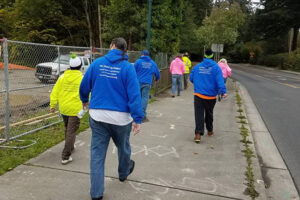
The Hand Up Project is working on the front-lines, even during the COVID-19 pandemic, to aid those out on our streets. “We stand beside them,” explained Robert Smiley, founder of the Hand Up Project, about the homeless, the addicts, the drug users, the alcoholics and the street people. “We’re here to help them through it,” Robert Smiley said, “I can’t do it for them, but I can walk with them.”
Robert Smiley talks a lot about walking with the people out on the streets, and staying beside them as they work their way into sobriety. Part of the work done by clients of The Hand Up Project is volunteering. In 2012, as Robert Smiley faced his seventh attempt to get sober, with despair but also a lot of determination, he finally took seriously the direction he’d been given to make his sobriety about others – and he set himself to volunteering (read his whole story on The Hand Up Project website – click here.)
To this end, The Hand Up Project does a lot of community projects, especially clean-up projects. Theresa Smiley, Robert’s wife and Treasurer of The Hand Up Project, has found former addicts “love cleaning up”, especially tent encampments (like the one at the Fremont Troll last year,) since it is a literal way for them to repair and remove the waste they’ve created in their pasts.
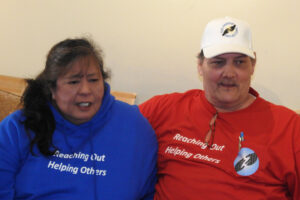
To Find The Way Out
“We try not to be enablers,” observed Theresa Smiley, about The Hand Up Project “we focus on helping people.” They help former addicts turn around and lend a hand to others, in place of using or drinking, or engaging in other destructive habits.
Robert Smiley likes to reference an old parable:
A man fell into a hole and couldn’t climb out.
A businessman happened by and heard the man call for help. The businessman tossed down some money and suggested he buy himself a ladder.
A doctor walked by and heard the man cry out. The doctor threw him a prescription.
A psychiatrist strolled by and heard the man plead for help. He stopped and asked, “How did you get into that hole? Were you born there? Were you put there by your parents?” After an hour of talking, the psychiatrist said he had to leave, but he would come back next week.
A priest came by and heard the man shout out. The priest sent him a bible and said, “I’ll say a prayer for you.”
Finally a second man came by and heard the first man call for help. Right away, the passer-by jumped down into the hole. The first man shouted, “Why did you do that? Now we’re both stuck here!” And the second man said, “It’s okay, I’ve been here before; I know the way out!”
For Robert Smiley, volunteering and assisting others led him out of his hole, and today he encourages those seeking sobriety to volunteer alongside him – making meals, talking to others, and throwing their energy and time into repairing the damage done by them and other addicts. As a result, Robert’s cell phone rings all day long with calls from clients, and friends, asking “Are we doing stuff today?”
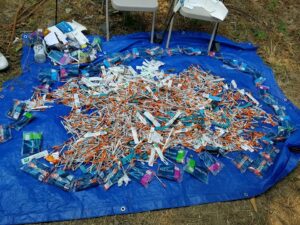
Yet, Robert Smiley admits the results he sees aren’t really about the activity but about the confidence and encouragement former addicts and alcoholics receive from their philanthropy. “Now people look up to them,” he explained, and the positive reinforcement “encourages them,” to stay sober and keep working towards recovery.
Robert Smiley spends a lot of time getting addicts and alcoholics into detox programs, and away from addictive substances and situations. After a month, or two, sober, Robert acknowledged, “they have to start looking at themselves, and dealing with what they find. It gets them down. It’s important to get out, and do something positive,” for the sake of others and for their own self-esteem. “It builds their self-confidence and integrity,” Robert Smiley observed. Recovering alcoholics, he said, “have to look at our past,” and yet, he advised, as they look, “they don’t need to tear themselves apart.”
Robert Smiley is about being honest and holding ourselves accountable for the damage done, but he’s also compassionate and sincere about how difficult that can be. He and Theresa Smiley want to offer ways that clients can ‘pay forward’ to the community and those they’ve hurt.
Sobriety, Not Replacement Addictions
In Lynnwood and South Everett, The Hand Up Project operates three houses where former addicts and recovering alcoholics can stay immediately after detox. For the first months after detox, “the worst place they can go,” Robert Smiley explained, “is back to family, or someone who cares.” He knows that some families really do care about the recovery of their brother, sister, father, mother, daughter, or son, but he makes sure the people he helps go to a neutral house where they live among others also working towards sobriety. “They are with people like them,” he explained, and “when they are B.S.-ing, they will be called on it. A family will pamper, and enable…”
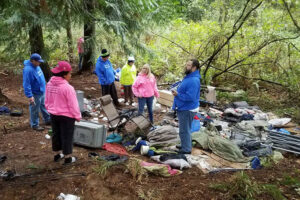
“As I’m trying to get someone through [sobriety,]” Robert Smiley explained, “I need them to get in touch with themselves.” This is why The Hand Up Project does not work with those on substance replacements, like suboxone, Adderall or methadone. “They never get to the real issues,” Smiley explained about users of the opioid-replacements. “You don’t have emotions,” he said, while on suboxone, just like “when you are drinking and drugging.” He tells clients, “you are not you. You are a chemical.”
At The Hand Up Project houses, Theresa Smiley admitted, they don’t accept people on replacement opioids. They know other places that can accept these residents, and provide them with the oversight needed but, “all our houses are zero-tolerance,” Theresa said, which the City of Seattle doesn’t currently support.
In Seattle, we have a lot of substance programs that provide replacements for heroin, meth, or OxyContin. Robert Smiley acknowledged that with these programs the addicts no longer have to steal to get high, but he sees them sell their prescription pills and trade their access cards for money.
“We don’t get grants because we are zero-tolerance,” Robert Smiley observed. “I’ve been doing this a while,” he explained, and he has seen that zero-tolerance works. As to ‘low-barrier’ or ‘wet houses’ which allows for the use of some or all substances, Robert said, “I don’t see the success rate.”
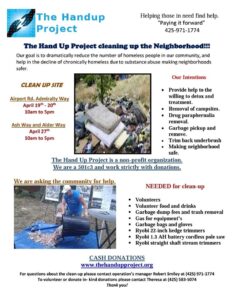
Multiple Tools, & Multiple Paths To Sobriety
While Robert and Theresa Smiley do help addicts and organize community projects in Seattle, and in Fremont and Ballard, The Hand Up Project works more in Snohomish County. Robert and Theresa Smiley have found more resources available to their clients outside King County. In Seattle/King County there is a lot of funding of homelessness programs but less assistance to those actively seeking sobriety.
The Hand Up Project also struggles, in Seattle, to find the embedded social workers who can locate an emergency overnight stay the moment it is needed, or access programs like HARPS and HEN that help with rent. It’s also harder in Seattle to get a bed in detox programs that accept clients without insurance.
In addition to detox, Robert Smiley has helped, with the assistance of DCR (Designated Crisis Responders) and the State’s Ricky’s Law to get some people into Behavioral Therapy, or other Involuntary Commitment evaluations, “to see if its addiction or mental health,” he explained. One person Robert worked with, “someone totally lost,” he eventually found heavy doses of vitamins helped to normalize and get the client straightened out.
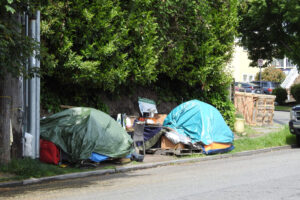
‘Everyone Deserves A 26th Attempt’
“I need them to know that I’m like them,” Robert Smiley said of his approach to the street addicts. He understands homelessness, and living on the streets. When working with someone, Robert refuses to let go or stop. He knows so many people out there that were told that someone would help, and were then let down. Robert Smiley promises not to let them down, as long as they do the work and walk beside him.
For as ready as Robert, and Theresa, are to give a hand-up, Robert Smiley did explain that he will stop helping, “when I’m doing stuff for you, and you aren’t doing it with me.” For them, the enabling line is clear. They invite anyone interested in getting sober to call on The Hand Up Project. “Everybody deserves a twenty-sixth attempt,” at recovery, Robert Smiley said.
If you know anyone, in Fremont, or elsewhere in our area, seeking to get off the streets and into sobriety, please feel free to have them call Robert Smiley and The Hand Up Project at 425/971-1774 or robertff@thehandupproject.org Also, if Fremont, or any community group, wants to organize a clean-up project, talk about sobriety, or donate, please consider contacting The Hand Up Project.
Related Articles
- A Resource For Mental Health At Swedish Ballard
- by Kirby Lindsay Laney, March 13, 2017
- Neighborhood Council Hosts A Heated Forum On Homelessness
- by Kirby Lindsay Laney, February 1, 2019
- Fremont Chamber Identifies ‘A Crime Problem’
- by Kirby Lindsay Laney, September 21, 2015
- Building Empathy, And ‘Facing Homelessness’
- by Kirby Lindsay Laney, August 16, 2013
©2020 Kirby S. Laney. This column is protected by intellectual property laws, including U.S. copyright laws. Reproduction, adaptation or distribution without permission is prohibited.

